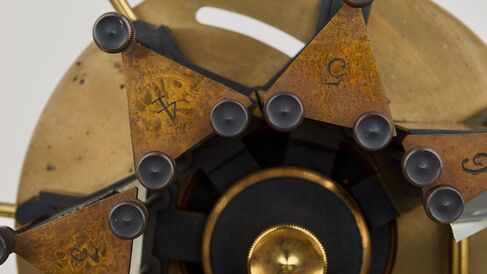Eclipse Teamwork

After months of preparation, eclipse observers only had a few short minutes to perform the many tasks expected of them. Popular accounts of these dramatic events celebrated British mastery of astronomy, imperial greatness, and the observers’ superiority over native populations. But records and reports from eclipse field sites reveal a more complicated picture of colonial fieldwork.
Craftswomen is a new exhibition at the Whipple Museum exploring the work of women in the British instrument trade between the 17th and 19th centuries. It exposes the often unseen work of the ‘craftswomen’ who made instruments for measuring, modelling and investigating the world.
There are many famous women in the history of science: Rosalind Franklin, Marie Skłodowska Curie, Caroline Herschel, and numerous others, about whom we are learning more all the time. Less well known are the ‘craftswomen’ who made instruments for measuring, modelling and investigating the world.
In this exhibition, you can see instruments made under the direction of women, and instruments by makers who were trained by women. Some instruments may have been crafted entirely by women – but this labour remains hidden, because women rarely signed their work. Women were also significant in the ‘print culture’ of science: publishing, printing and advertising instruments and discoveries.
As with many other areas of the history of science, women contributed actively to the creation and circulation of knowledge, and as we now see, also to the crafting of its tools.
Detail of our activities during Cambridge Festival are available at the Cambridge Festival webpage.
We are delighted to announce that Craftswomen, our latest exhibition, has won the British Society for the History of Science Exhibiting Excellence Prize 2023!
The judges were particularly impressed by
the way the exhibition knitted HSTM scholarship into the content of the exhibition; foregrounding the stories of women instrument makers through objects and interpretation.
The curators of the exhibition, Boris Jardine, Joshua Nall and Liba Taub, responded on behalf of the museum:
It is a huge honour to receive the BSHS Exhibiting Excellence Prize. The Whipple Museum has always aimed to make scholarly research accessible to a broad public audience, and it’s fantastic to receive this recognition from our peers. We thank our colleagues in the Museum, our numerous collaborators, and most of all the scholars whose work made our recovery of hidden labour possible—especially Gloria Clifton, Jane Desborough and Alison Morrison-Low.
The exhibition is currently running in our Main Gallery.
An eclipse party portrait
This photograph, and the notes recorded on its reverse, capture the observing team at Pulgaon, India, shortly after the eclipse of 22 January 1898. Pride of place is given to the astronomers and their travelling party, seated.
On the ground in front are three Royal Engineers and two members of the Imperial Civil Service. Standing behind are nine assistants, marked collectively as “Babus”, the title given to native Indian clerks.
The expedition’s leaders, Captain Hills and H. F. Newall, reported that “The skilled native assistants, provided by the kindness of the Surveyor-General, were thoroughly accustomed to observing work, and the preparations and preliminary drill proceeded with the utmost smoothness.”
Observing totality
During totality, an observing party was a whirlwind of carefully orchestrated activity.
Elapsed time was called out from the beats of a metronome (Image 1); temperature changes were recorded; strictly drilled teams exposed a succession of photographic plates; and senior astronomers observed the eclipse directly, drawing and dictating observations.
As astronomer Norman Lockyer recollected of an eclipse observed in India in 1871:
“There is strict silence in the fort, and the work of recording the … phenomena visible in telescope, spectroscope, and polariscope … goes on like clockwork; but it is very different below.
'The natives see in the eclipse their favourite god devoured by the monster Rahoo … Yells, moans, and hideous lamentations rend the air.”(1)
Native prejudices
As Lockyer’s quote (above) makes clear, eclipse observers were quick to draw distinctions between their own exacting work and the superstitions of their hosts.
Once astronomers returned to Britain their public reports often contrasted European observers’ rationality with what they saw as the primitive beliefs of locals—even those who had successfully assisted them. Accounts like this of the Astronomer Royal William Christie reinforced British notions of intellectual superiority and colonial difference:
“The natives of India regarded [the eclipse] as a very solemn religious function, and we were somewhat nervous as to whether our native assistants—who were high-caste Brahmins—might not fall down on their knees and begin to say their prayers, instead of attending to the duties they were told off to perform.
'I am very glad, however, to bear testimony that they performed their duties most satisfactorily and managed to reconcile duty and religion … I mention this as one of the things that cause some anxiety to observers during an eclipse, and to show that native ideas and native prejudices must be reckoned with.”(2)
References
1.J. Norman Lockyer, Contributions to Solar Physics (London: Macmillan, 1874), pp.343–44.
2.William H. Christie, public lecture, ‘The Photography of the Recent Total Solar Eclipse’, May 1898.
Joshua Nall
Joshua Nall, ‘Eclipse Teamwork’, Explore Whipple Collections, Whipple Museum of the History of Science, University of Cambridge, 2020.
